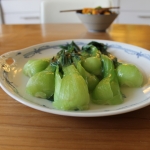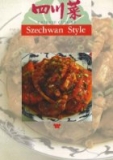Chinese Cuisine: Szechwan Style

Chicken-flavoured Bok Choi (雞油菜心, jīyóu càixīn)
Page 77
Cuisine: Chinese | Course Type: Main Courses
 View photos (2)
View photos (2)Tags: chinese bok choi chinese vegetables chinese cooking choy sum
Recipe Reviews
friederike from Berlin,
Slightly boring. I didn't taste any chicken at all. We only had half the bok choi needed, which isn't a problem as we we're planning to have the other half tomorrow anyway. Actually, this turned out to be in our favour, as I didn't see how I should have been able to boil the bok choi in just 3 cups of liquid. I skipped parboiling them and just boiled them in chicken broth for 3 minutes - DH thought this could even be a little shorter, while I thought I'd rather cook them a minute or so longer. We used goose fat instead of chicken fat, though I wouldn't expect this to be an issue.
We served this with Stir-fried Fillet of Beef with Mango , which was equally unimpressing.
Fun fact: I think this should have properly been translated as Chicken-flavoured Choy Sum instead of Bok Choi. I was surprised that none of the characters matched those of bok choi except for one: 菜, cài, meaning vegetables, dish, order, food. The first two were easy to find - 雞, jī, meaning chicken, and 油, yóu, meaning fat. The last character, 心, xīn, was easy because it's well known - it's the character for heart. It was only when I searched for the combination of cài and xīn that I found out that together, they mean choy sum.
As you may have noticed, the Chinese pronounciation of bok choi (白菜, báicài) and choy sum is fairly removed from what we call it in English. That is because the pronounciation I give here is Mandarin, while the names we know derives from the Cantonese pronounciation, baak coi and coi sam respectively.
(edited 9th September 2018) (0) comment (0) useful
Login or register to add your own review of this recipe.




